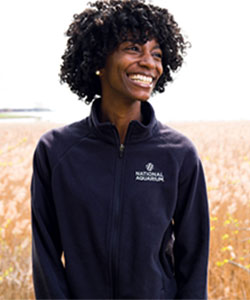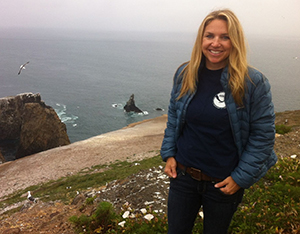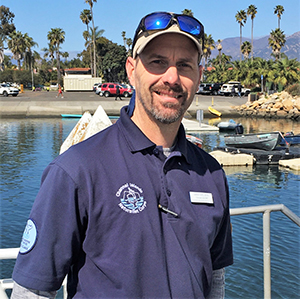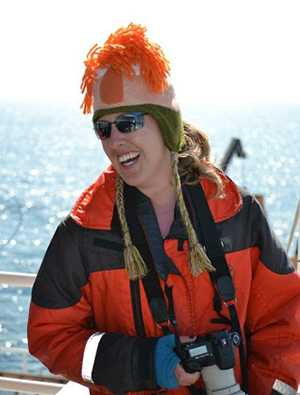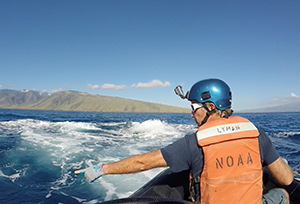Original Air Date: Tuesday, June 8, 2021
Length: 51 minutes
We have an exciting challenge for you! Whales are in trouble and need your help. Right whales in particular are on the brink of extinction and scientists, naturalists, disentanglement experts, and citizens are coming to the rescue.
Join Ocean Today for an incredible journey into the ocean, up in the air, and on to the shore! Host Symone Barkley, NOAA Fisheries biologist Allison Henry, and Channel Islands National Marine Sanctuary Outreach Coordinator Shauna Bingham will share how you can help scientists track whales using the Ocean Alert app. Channel Island Naturalist Dino Dal Bon will show us how scientists use the O.A. App data to communicate Right whale locations to ship captains, helping them steer clear of migrating whales, as well as report entangled whales and other mammals.
Webinar Speakers
Host: Symone Barkley
Symone serves as the National Ocean Service (NOS) Exhibits Manager and Education Specialist. She works to increase public awareness of products and services NOS provides through outreach at conferences, workshops, festivals, and other events. Symone hosts the Planet NOAA Podcast and Ocean Today, Every Full Moon, a collection of videos showcasing the beauty and mystery of the ocean realm while exploring various ocean topics. Through her support of NOS and NOAA education, Symone is committed to mentoring students, training educators, and creating authentic and effective systems to recruit and retain traditionally excluded groups in ocean science.
Shauna Bingham
Shauna Bingham has been working with NOAA Channel Islands National Marine Sanctuary for over 20 years communicating ocean science, coordinating citizen science programs and the Channel Islands Naturalist Corps program. Shauna has been instrumental in testing and implementing the Whale Alert and Ocean Alert citizen science apps to help NOAA's mission to reduce lethal whale ship strikes and monitor whale populations in the sanctuary. Shauna has also served as a USCG 100 ton vessel captain and small boat operator for NOAA, supported NOAA scientific dives and NOAA research cruises in the sanctuary. She spends as much of her free time as possible on the ocean boating, diving and surfing.
Dino Dal Bon
Dino Dal Bon has been a naturalist with the Channel Islands Naturalist Corp (CINC), a joint volunteer program between the Channel Islands National Marine Sanctuary and the Channel Islands National Park, since 2007. Dino has been instrumental in helping NOAA and partners field test the Whale Alert and Ocean Alert apps to record marine mammal sightings in near-real-time. He also supports the marine sanctuary with training volunteers to use these apps. When not working or volunteering, he enjoys photography, bicycling, LEGO, and takes every opportunity to enjoy our public lands.
Allison Henry
Allison Henry has been fascinated by whales since I she was 6 years old and is amazed that she has a job where she gets to study them. Allison majored in Biology at Saint Mary's College of Maryland on the Chesapeake Bay. After graduating, she worked at a non-profit organization in Gloucester, MA where she studied humpback whales for 7 years. She then started observing whales with aerial survey teams, studying right whales in their southeast calving ground for 3 winters. In 2005 she moved to Cape Cod and began working for NOAA/NMFS at the Northeast Fisheries Science Center in Woods Hole, MA. She has been a part of their large whale team ever since, spending her time either out on a research boat, in a small plane, or at her desk working with others to help save this species from extinction.
Ed Lyman
Ed Lyman is currently the Hawaiian Islands Humpback Whale National Marine Sanctuary’s Natural Resource Management Specialist and leads the sanctuary’s health and risk assessment program that monitors the risks to and health of humpback whales within the sanctuary and nearby waters. He has participated in over 110 disentanglement efforts and helped free more than 65 large whales – 34 off Hawaiʻi. He assists NOAA in coordinating a community-based network to provide safe and authorized monitoring and response to entangled large whales. However, the ultimate goal is working with fishermen, scientists, managers, and others to gain valuable information – the science, that may reduce entanglement threat in the future.
top
 An official website of the United States government.
An official website of the United States government.

